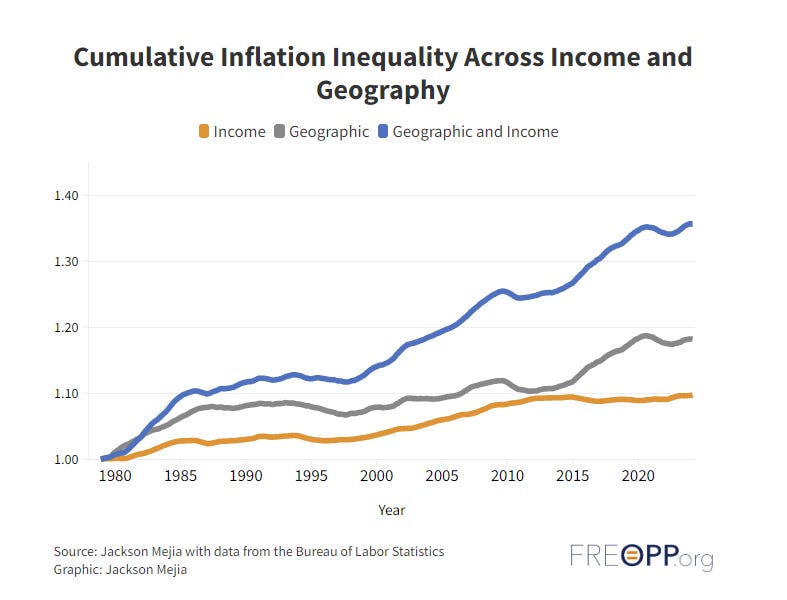Where you live changes how you experience inflation

The disparate geographic impact of inflation: Month after month, as Americans grapple with the high prices of essentials from housing to groceries, they cite inflation and the economy as the most important problems facing the county today. In previous research, FREOPP demonstrated that inflation disproportionately harms lower-income households. This week, FREOPP Research Fellows Jackson Mejia and Jon Hartley released a new paper showing that where you live also matters. That’s because there are significant differences in regulations, income, and transit costs from state to state and from region to region. For example, prices are 20 percent higher on the coasts than in the Midwest, where real wages have grown the most in the last 40 years. Unfortunately, that region also has the highest inflation inequality of anywhere in the country. The bottom line? While both the Federal Reserve and states and localities have created inflation and increased the cost of living, policymakers need to use targeted fiscal policy—not national monetary policy—to help those hurt the most.

Does college pay off? Did you know that nearly half of master’s degree programs leave students financially worse off than if they hadn’t sought the degree at all? Or that the financial return on a bachelor’s degree can vary from more than a million dollars to a net-negative return, depending on what you choose to study? FREOPP Senior Fellow Preston Cooper’s latest calculations break down the financial consequences of choosing among more than 50,000 post-secondary degrees. Preston argues that, while ROI should not be the only consideration for those approaching the college decision, ROI estimates can help students and their families make better choices regarding higher education. Policymakers and regulators should also factor in ROI as they consider how to spend federal and state education dollars.
→ Dig into the report and look at the data for specific degrees and schools at roi.freopp.wpengine.com, and read more from Preston in articles describing his findings at Fortune, The Hill, and Reason.

How drug companies stifle competition with “product hopping:” “Product hopping” is a common strategy that the pharmaceutical industry uses to keep drug prices—and revenues—high. Here’s how it works: Taking advantage of the way that federal laws and regulations distort the prescription drug market, companies use either temporary discounts and sales pitches or dramatic changes like pulling a drug off the market to get doctors to start prescribing a new, modified version of a familiar, about-to-lose-its-patent drug. These tactics delay the entry of generics into the market and preserve monopoly prices for the company. In Forbes this week, FREOPP President Avik Roy uses the example of the drug company Actavis and its Alzheimer’s drug Namenda IR to show the practice in action and describe why it hurts patients though high prices and squandered opportunities to create truly new and innovative products.
The policy implications of Grants Pass v. Johnson: In April, City of Grants Pass, Oregon v. Johnson went before the U.S. Supreme Court. The case could have significant implications for how municipalities address the ongoing problem of homelessness, as the Court examined a town law that effectively bans sleeping or camping in public spaces. Although a majority of justices appeared likely to uphold the ordinance, FREOPP Senior Fellow Michael Tanner argues that the policy won’t solve the homelessness problem, which stems from complex issues including housing shortages, mental health, and substance abuse. Instead, he writes, localities should focus on better and proven policies including investing in treatment, building more affordable housing, reestablishing institutional care, and enacting broader social mobility policies.
Thanks for keeping up with FREOPP, and have a great weekend!
FREOPP’s work is made possible by people like you, who share our belief that equal opportunity is central to the American Dream. Please join them by making a donation today.


